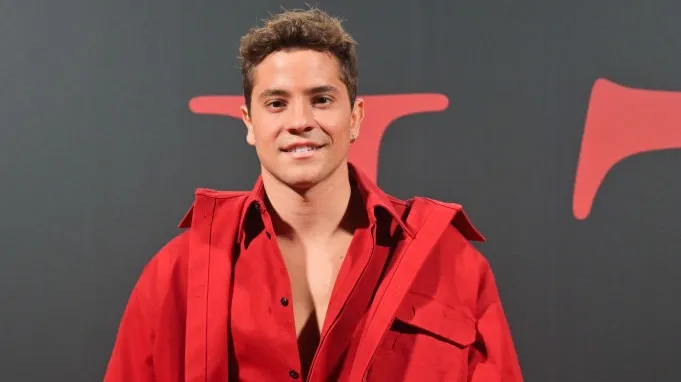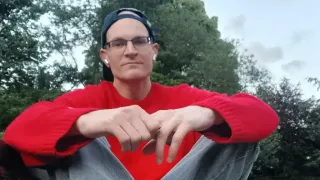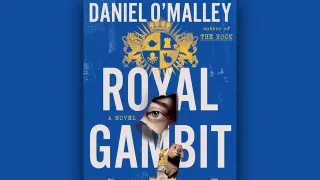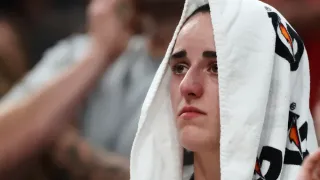March 25, 2021
Mari Walker, Pooya Mohseni, and Lynn Chen Open Up About Trans Drama 'See You Then'
Kilian Melloy READ TIME: 15 MIN.
Mari Walker's trans drama "See You Then," a film festival favorite last year, is in limited theatrical release now, with a DVD and VOD release from Breaking Glass Pictures to follow on April 18. Below is an interview with Walker and the film's two leads, Pooya Mohseni and Lynn Chen, first published at EDGE on March 25, 2021.
Drawing on her own experiences as a transgender woman, director Mari Walker co-wrote and helmed "See You Then," a drama that's understated – but not to be underestimated.
The story of two former lovers who have not seen each other in nearly a decade and a half, the film brings Kris (Pooya Mohseni) and Naomi (Lynn Chen) together again for a night of reconciliation and resolution. The characters meet in neutral territory – a restaurant – and then, gradually, begin to enter more personal spaces, finally ending up paying a visit to an art studio at the college they both attended. It's a fraught journey, full of intense emotions: Nostalgia, love, rage, grief. For a film about such tectonic feelings, "See You Then" is also remarkably sensitive, a story constructed from nuance rather than having nuance painted on.
Adding to the story's potency is the fact that Kris is now a woman; Naomi, we learn, never knew that the man she was in love with in her youth identified as female, and never had a chance to hear it from him. Kris simply left one day, with no explanation, and Naomi had to hear of Kris' transition, years later, from a mutual friend.
"See You Then" is remarkable for its characters – their trueness to life, and the way they are given flesh and substance by Mohseni and Chen – but also for the perspectives it offers on womanhood and, especially, what it means to become a woman after having lived as a man. "I lost all my social currency," Kris sighs at one point, and yet there's never any sense that she would want to go back to being someone inauthentic to her genuine self.
EDGE had a chance to chat with Walker and both the film's leads. Pooya Mohseni is, in addition to being an actress with various film and television roles, a writer and transgender rights activist. Lynn Chen is a prolific actor, and one with experience in films with an LGBTQ slant, having starred in the Alice Wu-written and directed lesbian comedy-drama "Saving Face." Chen is also a director in her own right with last year's release of her debut feature, "I Will Make You Mine."
EDGE: Mari, this is your first full-length feature. Was this the story you wanted to tell as your feature film debut, or was it more like this was the story that made you want to make a feature film in the first place?
Mari Walker: I had dream of making films since high school, and I had written a number of scripts that I was very excited for, but they were all so far outside of a first-time feature filmmaker's budgetary range that I thought it was important to take a step back and work on something that was a little more intimate, a little bit more of a chamber piece between two characters.
At the time I was sort of going through my own experiences that were somewhat similar to Kris and Naomi both: Trying to find that work/life balance, coming to terms with the past and the choices I had made, the sacrifices I had made. So the film – and the script in particular – became a form of art therapy for me. Before I knew it, these characters became fully-fledged individuals and I fell in love with them. Then I felt so guilty, kind of ruining their lives! But I think that's the choice you have to make when you're creating something dramatic.
EDGE: The film very clearly comes from the perspective that trans women are women, and it's telling a story from a female perspective, cis and trans alike. How did wanting to explore that perspective inform the writing, direction, and performances?
Mari Walker: I think we hoped to tell a story that was built within the trans community, but post-transitioning. So many narratives are built around the mystique of transitioning and how foreign it is for most audiences. But I think the real interest comes after that experience: How do you then navigate this world that you've existed with two different identities for a period of time? And all those things were being informed not only by my life experiences, but also the experiences of people around me – how they felt about womanhood and transitioning, and what it meant to be a woman. So, it was really like the whole film and the experience of making the film almost became like this mass conversation about these experiences and what they meant.
Pooya Mohseni: I would even take it further, in that all women are different and all women are the same. So when people tell me, "You are a woman?" I'm like, "Yeah, I am a women, I just happen to be a trans woman." How I got to that womanhood is different from a cis woman, but in many other ways, as we talk about in the film, it's "What does a woman look like? What does a woman do? What are the expectations of a woman in society? Does every woman have to be a mother to be woman? Is it makeup? Is it long hair? Is it X, Y, and Z?"
How I approached it, what made me really fall in love with this project, was the trans character wasn't somebody else's fantasy. It was her full story. What did she have to do to become her true self? What was the cost in that? What did she learn from that? Where is she now, in regard to that? Where does she want to go? And how does all of those relate to her counterpart in the movie, which also made me question a lot of things in my personal life. Am I still a woman if I have short hair, or is my womanhood attached to just having long hair? And children, and all of the things we talked about [in the film].
But what I really loved about it is these characters were full. She wasn't just a trans woman; she was a person who had needs and desires and shortcomings, She had regrets; she had part of her life that she would like to do over. She had some guilt, and also something I felt with her was this need to have permission to exist, [a need that] a lot marginalized people, and especially queer individuals, have, because society hasn't told them that they have the permission to exist. So, she walks around with this sense of, "Is it okay? Can I exist?" Which I kind of feel you can also see through the movie as they grapple through that together.
But not only that; to have this trans character have an entire movie with a women that... it's not about coming out. It's not about a man. It's about the two of them as two people who have this past, and this is where they are, and how do they navigate it? What do they need from this encounter, and how can they move forward from it?
Lynn Chen: As a cis woman who studied gender and feminism in college, I feel like there's just so much for me to learn about the trans experience, and I feel like anybody who is equally curious who watches this movie who isn't trans will learn a lot, as I did. I feel very lucky that I was able to be this voice, and also to have Mari and Pooya just answer my questions and be really open with me, which I don't think most cis women who are curious have the opportunity to do. And so I think just knowing that this movie exists for people to start this dialogue, maybe see this as an example of, "Oh, maybe it is okay for me to ask, and how do I do this, and how do we have conversations around this topic while still having respect and humanity and a mutual appreciation for one another?" I think that's something I hadn't really thought about, and making this movie it's something I think about with almost everything that I do – in every space where I enter where I don't know somebody identifies think about this now.
EDGE: I loved "Saving Face," by the way, which is another example of how, as you're pointing out, movie are very important in terms of the stories they allow to be told and the representation they make room for.
Lynn Chen: Yes, absolutely, and with "Saving Face," fifteen years ago when we made it I had no idea how much it would make an impact. It really means a lot to me that it still holds the test of time. I hope the same thing is true for "See You Then," fifteen years from now, so that people will come up to Mari and Pooya and myself and say, "Wow, that movie really changed the way I thought about [things]."
EDGE: Pooya and Lynn, your characters have a specific kind of relationship that they've come from, and they are working their way toward another, very different, kind of relationship. Behind the camera, though, what was your relationship? Did you have a sisterly bond?
Pooya Mohseni: I felt that with a story this sensitive we needed to be connected as actors, and to have that full trust – that I can go into free fall, because I know that you're gonna be there for me. So, behind the camera I was trying to be there for Lynn for whatever she needed, and that's what Lynn gave to me. I don't think this story could have happened any other way, because there were so many nuances.
Lynn Chen: I completely agree, Pooya. I feel like most projects I am a part of, it's sort of like you're just yourself until they call "Action," and then you act. But with Pooya, I feel like we were both so invested in this story, and the backstory, and there's so many layers to these two characters and what they've been through. If I had a thought about something, I would hop onto WeChat and sent Pooya a message and say, "What do you think of this?" And she'd get back to me so we could be on the same page about it. This is not something that normally happens in any other roles that I've done, just because your time off is your time off, and your time on is your time on. But this time period when we were making this movie was all about the story, and how we could make it as full and complete and as rich as possible.
EDGE: Mari, these characters are coming from very different and specific places, with Naomi complaining a lot about her life, while Kris talks a lot about herself, as if she's got to explain as a part of her apology. These threads and traits wind around each other through the whole film. Was some of this a matter of talking about the characters and story with your two leads?
Mari Walker: It was; it was also a lot of workshopping in the writing process. My cowriter, Kristen Uno – [who is] also one of our producers – was integral in that, and I think it's always very helpful to have a co-screenwriter, somebody to bounce ideas off of, because writing can be such an isolating experience. When Kristen and I were discussing themes of the story and then started building out the characters, we would read the dialogue to each other, and I hate hearing my own voice... it's a little grating, even for myself.
[Laughter]
Mari Walker: But it's really helpful because it helped us create that cadence, that naturalism. And at a certain point I came to this feeling that if we got the script right, and I could perform it with emotion, then hopefully very much more talented performers – way beyond my elementary skill level – can go and add that depth to those characters.
EDGE: I love the literary structure of the movie, how the characters slowly enter more meaningful spaces until they arrive back at their old college stomping grounds, which is the place, psychologically, they have to go in order to move forward with their lives. Did you build this structure with all of this in mind? Or was it an intuitive choice?
Mari Walker: It tends to be more of an intuitive process, I think. I know it was a matter of figuring out how long we can exist in those spaces, how long we can exist in those conversations. A lot of it was trimming and cutting, and even when we were on set we were doing that, and even in post we were trying to finesse and get down to that pure essence of what the story was. That's part of the great process of it; you go through all these different steps that allow you to reevaluate the material in different ways. And then it becomes something that's not your own any more, it's everybody's, and that makes it feel beautiful. I'm just so thrilled that now the film exists outside of our own artistic sphere.
EDGE: Pooya, you are a transgender rights activist, and I wonder if your acting is part of your activism.
Pooya Mohseni: Absolutely. I can't separate the two, because as an actor I'm telling you stories. What stories do I want to tell? What is their significance? I feel that sometimes it's my activism that's actually pulling my acting. Maybe this is my version of megalomania, but what do I want my mark to be? What do I want my legacy to be? What do I want to add to the world? That obviously comes from my point of view as I have experienced it, knowing that there wasn't a movie that had a trans character when I was in my teens. The closest I could have come to it would have been "The Crying Game," which I know now may feel dated, but almost thirty years ago it felt revolutionary because it was the first movie that had a trans character who was the heroine of the movie, who did not get killed, who was not the villain. As a teenager who was trying to find my identity, that was very important.
Now, when I look at the representation, yes there is a show like "Pose" – which unfortunately is coming to an end – but I'm looking at, "What am I adding to the narrative? Can the younger generation or anybody at any point in their journey look at this and feel kinship?" Or, even beyond that, that family members of a trans person can look at this and say, "Oh! You know, a trans person can have all the same questions and problems as anybody else. They are not crazy, as they may have been represented on Jerry Springer or whatever." And in that sense, yes, I would like to be part of a good force for my community, for queer people of color, not just the audience, but also the actors, the writers, the filmmakers.
EDGE: It's so refreshing to see a film that not only comes from a female point of view, both trans and cisgender, but has an Asian American and an Iranian American as its main characters and its leads. As the medium of film grows with more streaming platforms coming online, is it getting easier to tell stories that offer more diversity?
Mari Walker: I think that there are more opportunities, but it's also harder to get your film seen and heard. I do worry that a lost of voices are being lost in the shuffle, and especially now, with COVID and the lack if theaters. But I think that is doing to force all of us to work even harder and keep on fighting the good fight. The pendulum swings back and forth, and thankfully we've had an opportunity to get a lot of trans-related projects out into the world. But I don't think that fight is ever really going to end until we get a completely equal playing field for all voices.
Pooya Mohseni: I will add for my part that I don't believe that change is just happening; I believe there are people who, inch by inch, are making it happen, and have worked at doing it, [like] the people at the Casting Society of America and their inclusion department, which actively is working to have a more varied plethora of actors being presented to show runners and producers and directors. That's what CSA is doing, what SAG is trying to do to be more inclusive, and to add more variation to the actors who have the opportunity to be seen, the same as WGA, PGA, and all of these guilds. We just see the change, but as someone who has also worked with CSA to try to create this opportunity, I sometimes see how difficult it is to try to move the pendulum. The fact that there are people who are fighting for that change – people who are cis, people who are white, but they believe that there should be a better, more inclusive representation of America and the world – knowing that those people are fighting in their own respective boxes gives me hope, and it gives me energy to fight it on my front as an actor, activist, and writer.
Lynn Chen: I've been in this industry for several decades now, and I always get asked this question and it's something that in the past I've said yes but not really meant it.
[Laughter]
Lynn Chen: I do see change, but that said, I put out my first feature [as a director] last year, and I still feel like even though that was an incredible accomplishment, a movie's life doesn't end with the release. We're going to see how just making these stories happen, as Mari just did, are going to lead to more opportunities, and we cannot just say, "We did it, that's it!" It's a stepping stone, and we have to keep feeding one another. I think that's a part of it, no matter what ethnicity you are, and whatever your sexual orientation – however you identify.
This is a really tough industry, and to survive in it you have to be able to grow, thrive, and evolve. Giving one another the space and the encouragement for that is really important, because there are trolls there that want to take us down! Actively trying to take us down, and us being able to give each other the space to know that it's okay, you can move beyond this, is really important.
It's hard, because it does feel a little bit like the wild, wild west in a lot of ways. There's a lot of things that we don't know about quite yet, as we move more into streaming platforms. So, there's an enormous amount of opportunity. I'm really excited about that. But at the same time, we have to be careful about how we encourage one another and how we uplift one another.
"See You Then" premiered at the 2021 SXSW Film Festival.
Kilian Melloy serves as EDGE Media Network's Associate Arts Editor and Staff Contributor. His professional memberships include the National Lesbian & Gay Journalists Association, the Boston Online Film Critics Association, The Gay and Lesbian Entertainment Critics Association, and the Boston Theater Critics Association's Elliot Norton Awards Committee.






